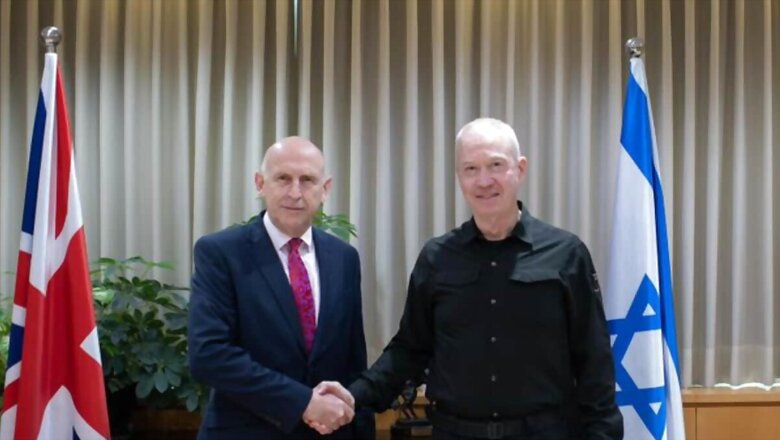
views
Israeli defence officials are actively coordinating with the United States and the United Kingdom in anticipation of a potential strike by Iran, similar to an attack thwarted by the country’s top allies earlier in April.
This comes as Iran has threatened retaliation for the recent assassination of Hamas chief Ismail Haniyeh amid the ongoing war in Gaza that is on the verge of escalation in the wider Middle East region.
READ MORE: Israel-Iran Conflict LIVE Updates: Fears Of War Grow After Hamas Chief Haniyeh’s Killing, Hezbollah Fires ‘Dozens’ Of Rockets
‘Abraham Alliance’
Last month, Israeli Prime Minister Benjamin Netanyahu mentioned the coordinated defence from April in a controversial speech to a joint session of the US Congress, suggesting it could serve as a model for a NATO-like alliance he called the “Abraham Alliance.”
Israeli Defence Minister Yoav Gallant confirmed on Friday that he spoke with US Secretary of Defense Lloyd Austin and UK Defense Secretary John Healey, providing them with a situational assessment amid rising tensions in the Middle East. During a call with Gallant, Austin informed the Israeli minister of additional measures taken by US, including future defensive force posture changes, that the Pentagon will take to support the defence of its ally.
Austin highlighted that further escalation is not inevitable and that all countries in the region would benefit from a de-escalation, including through completing a Gaza ceasefire and hostage release deal. However, he stressed that the unprecedented scale of US support for Israel since October 7 should leave Iran, Hezbollah, and other groups with no doubt about US resolve.
Meanwhile, the Israeli Defence Minister hosted his UK counterpart Healey this week and discussed the important defence ties between the two countries and their shared commitment to maintaining and further strengthening cooperation in several strategic and military areas. The talks between the allies came as Middle East tensions soared Saturday as Iran and its allies readied their response to the assassination of Hamas’s political leader, blamed on Israel, spurring fears of a regional war.
This morning, I hosted the UK Secretary of State for Defense, @JohnHealey_MP.We discussed the important defense ties between Israel and the UK, and our shared commitment to maintaining and further strengthening cooperation in a number of strategic and military areas.
Thank… pic.twitter.com/0VclLOaCpp
— יואב גלנט – Yoav Gallant (@yoavgallant) August 2, 2024
Middle East tensions soar
The United States this week said it would move warships and fighter jets to the region, while Western governments called on their citizens to leave Lebanon and airlines cancelled flights. The killing of Hamas leader Ismail Haniyeh in Tehran, hours after the Israeli assassination of Hezbollah’s military chief in Beirut, has triggered vows of vengeance from Iran and the so-called “axis of resistance”.
Iran-backed groups from Lebanon, Yemen, Iraq and Syria have already been drawn into the nearly 10-month war between Israel and Palestinian militant group Hamas in Gaza. Israel on Saturday again traded fire with Hezbollah, carried out a deadly raid in the West Bank, and struck a school compound in Gaza City in an attack that the Hamas-ruled territory’s civil defence agency said killed at least 17 people.
Haniyeh was buried on Friday in Qatar, where he had been based. Israel, accused by Hamas, Iran and others of carrying out the attack, has not directly commented on it. Iran said on Saturday it expects Hezbollah to hit deeper inside Israel and no longer be confined to military targets. The Pentagon said it was bolstering its military presence in the Middle East to protect US personnel and defend Israel.
It said an aircraft carrier strike group led by the USS Abraham Lincoln would be deployed, as well as additional ballistic missile defence-capable cruisers and destroyers and a new fighter squadron. Soon after, Hezbollah announced it had fired dozens of Katyusha rockets at the northern Israeli settlement of Beit Hillel. They said it was in response to an Israeli attack on Kfar Kela and Deir Siriane in southern Lebanon which, it said, had injured civilians.
(With agency inputs)




















Comments
0 comment